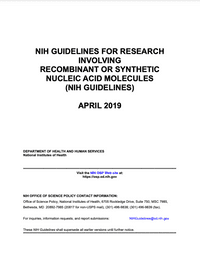NIH Guidelines for Research Involving Recombinant or Synthetic Nucleic Acid Molecules, 6th Edition
[Recombinant Nucleic Acid Molecules Guidelines, 6th Ed]
These are guidelines are necessary to follow for any researchers working with recombinant DNA and receiving money from the NIH. The guidelines specify biosafety practices and containment principles for constructing and handling: (i) recombinant nucleic acid molecules, (ii) synthetic nucleic acid molecules, , and (iii) cells, organisms, and viruses containing such molecules.
SUMMARY
The United States National Institutes of Health (NIH) Guidelines for Research Involving Recombinant or Synthetic Nucleic Acid Molecules outline standards that all research within the US, and/or that has been funded by the NIH, which uses synthetic or recombinant nucleic acids must abide by. The guidelines include lists of experiments that need approval by the NIH and an Institutional Biosafety Committee (IBC). It also contains a risk assessment for various biological agents and dictates the roles and responsibilities of all groups along the research pipeline, including the research institution, the principal investigator, and the NIH itself. Although the guidelines are specific to the US, the biosafety practices and containment principles for researchers doing nucleic acid research are applicable worldwide.
The guidelines were first published in 1976, as a direct output of the Asilomar conference on recombinant DNA. The guidelines are expanded every few years, and are currently on their 6th edition, which was published in 2019. The guidelines are published by the Biosafety Policy and Recombinant DNA Policy Program at the NIH Office of Science Policy, who in addition to publishing biosafety guidelines, also run an advisory committee that assess the biosafety risk of emerging biotechnologies. The NIH Office of Science Policy also has divisions that focus on biosecurity, dual use research and data sharing. The guidelines are available in English


..png)
